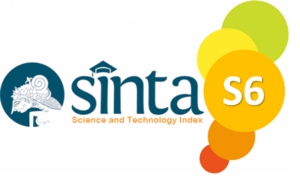Analisis Pemahaman Konsep Matematis Mahasiswa Statistika Pendidikan Prodi Pendidikan Ekonomi Pada Tahun Ajaran 2021/2022
DOI:
https://doi.org/10.32493/pekobis.v6i2.P57-66.18791Keywords:
Pemahaman Konsep, Statistika, Pendidikan, Ekonomi, MahasiswaAbstract
Education Statistics is a subject that is not easily mastered by Economics Education students. This study aimed to analyze the level of understanding of mathematical concepts of Education Statistics students in Economics Education Study Program. The research applied a descriptive qualitative approach. The research sample was the fourth semester students of the UNPAM Economic Education study program in the Odd semester of the 2021/2022 academic year. Data were collected by using essay test and observation techniques. Data were analyzed by descriptive statistics. The results of the analysis of each indicator of understanding mathematical concepts were: (1) re-explaining the concepts and formulas of the material to get the medium category; (2) categorizing the types of statistics used based on the questions to get a medium category; (3) calculating the required prerequisites through SPSS to get a low category; and (4) applying SPSS according to the type of statistics used to get the medium category. So it can be concluded that the level of understanding of mathematical concepts of Education Statistics students in the Economic Education study program in the 2021/2022 academic year was classified as moderate.
References
Abdillah, C. (2021). Efektivitas Metode Pembelajaran Synchronous dan Asynchronous terhadap Hasil Belajar Mahasiswa di Perguruan Tinggi. INTELEKTIUM, 2(2), 144-154.
Agus, I., Sangila, M. S., & Riansyah, F. (2021). Efektifkah perkuliahan daring pada statistika pendidikan di era pandemik covid-19?. Ekspose: Jurnal Penelitian Hukum dan Pendidikan, 1(1), 1174-1181.
Carl, M., Cramer, M., Fisseni, B., Sarikaya, D., & Schröder, B. (2021). How to Frame Understanding in Mathematics: A Case Study Using Extremal Proofs. Axiomathes, 31(5), 649-676.
Dewi, W. S., & Afrizon, R. (2018). Analisis kondisi awal perkuliahan mahasiswa pendidikan fisika dalam rangka mengembangkan bahan ajar statistika pendidikan fisika menggunakan model problem solving. Jurnal Eksakta Pendidikan (JEP), 2(1), 93-100.
Fajar, A. P., Kodirun, K., Suhar, S., & Arapu, L. (2019). Analisis kemampuan pemahaman konsep matematis siswa kelas VIII SMP Negeri 17 Kendari. Jurnal Pendidikan Matematika, 9(2), 229-239.
Firmansyah, M. A. (2017). Analisis hambatan belajar mahasiswa pada mata kuliah statistika. JPPM (Jurnal Penelitian dan Pembelajaran Matematika), 10(2).
Green, J. (2010). Points of intersection between randomized experiments and quasi-experiments. The Annals of the American Academy of Political and Social Science, 628(1), 97–111.
Gusmania, Y., & Agustyaningrum, N. (2020). Analisis pemahaman konsep matematis mahasiswa pada mata kuliah trigonometri. Jurnal Gantang, 5(2), 123-132.
Pujiati, P., Kanzunnudin, M., & Wanabuliandari, S. (2018). Analisis pemahaman konsep matematis siswa kelas IV sdn 3 gemulung pada materi pecahan. ANARGYA: Jurnal Ilmiah Pendidikan Matematika, 1(1), 37-41.
Surya Anggara, D., & Anwar, S. (2017). Statistika Pendidikan.
Unaenah, E., & Sumantri, M. S. (2019). Analisis Pemahaman Konsep Matematis Siswa Kelas 5 Sekolah Dasar Pada Materi Pecahan. Jurnal Basicedu, 3(1), 106-111.
Yanala, N. C., Uno, H. B., & Kaluku, A. (2021). Analisis Pemahaman Konsep Matematika pada Materi Operasi Bilangan Bulat di SMP Negeri 4 Gorontalo. Jambura Journal of Mathematics Education, 2(2), 50-58.






